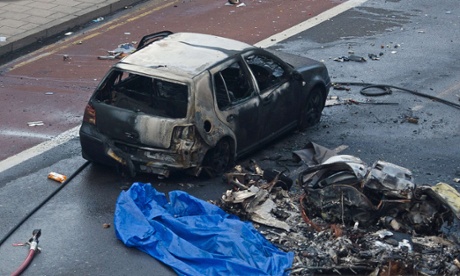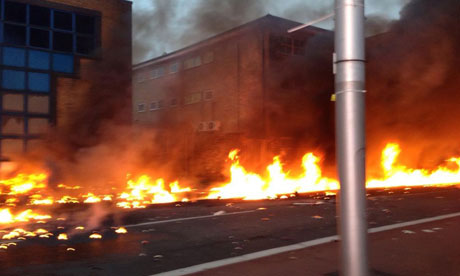The fatal helicopter crash in London on Wednesday morning once again put Twitter in the spotlight, with the social network beating traditional media to the story with instant eyewitness accounts, pictures and video.
That BBC Radio 4 Today programme referred to Twitter as the news was breaking showed just how much social media has transformed the way mainstream news organisations cover breaking stories in recent years.
By the afternoon, the London Evening Standard was splashing with a photo taken by Craig Jenner, @craiglet showing the rush-hour accident, capturing the blazing debris strewn across a street and a convoy of emergency service vehicles on their way to the scene.
The speed with which the media used eyewitness photos posted on Twitter is not surprising given the nature of the story, but it raises an issue about copyright. In the past, such material was called user-generated content, or citizen journalism. Now it's just Twitter and everyone should be aware of the rules of engagement.
 Debris and a fire damaged car are pictured at the scene of the helicopter crash in central London. Photograph: Leon Neal/AFP/Getty Images
Debris and a fire damaged car are pictured at the scene of the helicopter crash in central London. Photograph: Leon Neal/AFP/Getty Images Until not long ago, there was a feeling that as the user put the picture into the public domain it was therefore a free for all. But news organisations' picture desks no longer hide behind this dubious cover.
The Daily Mail, the Sun, the Guardian, Sky News, news agencies the Press Association and Caters News, and the Evening Standard – all of which used Twitter pictures of Wednesday's Vauxhall crash – acknowledge that, under the law, the photographer owns the copyright.
Twitter's terms of service do not change this. They merely give Twitter the licence to use the photos or videos.
An Evening Standard picture desk executive said that in the heat of the moment, the paper could not contact Jenner about its splash, but if he, or anyone else, contacts them regarding payment, they will oblige.
"All the information about the source of the photo is entered into the database and remains in our library. We've always been of the view whoever took the photo owns the copyright, and if they want payment, there is no question they will be paid," said the Evening Standard source.
Nic Walker, a Vauxhall resident, who found his material, particularly a video he shot on his phone, picked up by TV and newspaper websites including Telegraph.co.uk and guardian.co.uk (via ITN).
Followers on Twitter were telling him he "was owed thousands" by the media and he should pursue his rights. "Fascinated by the comments. Lots of ppl encouraging licensing of the vid, some praise and a few off colour jokes!" he responded.
But he protested that he did not want to cash in on a disaster that had left two people dead.
"Amazing how many people are encouraging me to make money from a few incidental photos of a horrible fatal accident. Just credit me!," Walker tweeted.
Walker later told MediaGuardian he had "two or three offers from smaller agencies trying to monetize it on my behalf. I'm not interested".
 Burning helicopter fuel after the crash in Vauxhall. Photograph: Nic Walker/Rex Features
Burning helicopter fuel after the crash in Vauxhall. Photograph: Nic Walker/Rex Features If the debate on Twitter on fees does not concentrate minds, a recent copyright infringement case heard in New York will.
The rights of the Twitter poster in the case were confirmed late on Monday by district judge Alison Nathan, who found that two media outlets – the Washington Post and Agence France Press – had infringed copyrights of photographer Daniel Morel in using pictures he took of the aftermath of the Haiti earthquake in January 2010.
AFP, which has clients around the world, had argued that once the pictures were available on Twitter they were freely available for it to distribute.
However, the judge ruled that Twitter's terms of service does not waive copyright for the photographer and AFP was in the wrong.
Acceptance of this seems to be increasing in the UK. A Mail Online insider said it credited sources of photos whether from Twitter or AFP and will pay for photos published.
One Tweeter whose picture relating to a more trivial story – the death of the Tatler dog Alan on Tuesday – is understood to have phoned Mail Online and was told she would get £40.
"People used to just help themselves to stuff on Facebook or Bebo before that. That doesn't happen any more," said the Mail Online insider.
The pendulum appears to have swung so far in the direction of the Twitter account holder, that some have spotted a commercial opportunity.
A source at Caters News agency in Birmingham, which distributed a second video posted by @Tom_Avis, said it enters agreements with posters to license their material and will share the spoils.
The Guardian, which also publishes MediaGuardian, has a policy of publishing with permission and says where it inadvertently publishes without permission it will seek to rectify the matter as quickly as possible and pay for usage.
• To contact the MediaGuardian news desk email editor@mediaguardian.co.uk or phone 020 3353 3857. For all other inquiries please call the main Guardian switchboard on 020 3353 2000. If you are writing a comment for publication, please mark clearly "for publication".
• To get the latest media news to your desktop or mobile, follow MediaGuardian on Twitter and Facebook.
No comments:
Post a Comment